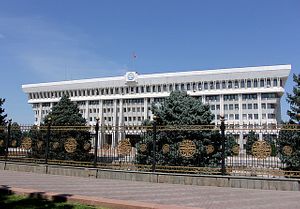Elections in Central Asia are notoriously acts of democratic theater where pre-determined outcomes are dressed up with the excitement of voting. The only real question is by how much the incumbent will beat out the loyal contenders, who generally, on the campaign trail, endorse the sitting president’s policymaking wisdom.
Significant power transitions come only with the death of the incumbent, except in Kyrgyzstan, where power transitions have been forced by the body politic taking to the streets in 2005 and 2010.
This year Kyrgyzstan hopes to become the first Central Asian state to transfer power between individuals peacefully, following established laws rather than circumventing them, and most meaningfully, allow people actual choice in their future leader. The current president, Almazbek Atambayev, took office following a post-revolution election and the brief interim presidency of Roza Otunbayeva. On October 15, Kyrgyz will head to the polls and elect Atambayev’s successor.
The deadline to declare an intention to run for the office and file initial paperwork passed on August 1. Fifty-nine individuals filed, 11 nominated by political parties and 48 independents. In order to appear on the ballot each prospective candidate must collect at least 30,000 signatures, pay a 1 million som ($14,600) deposit, and pass a Kyrgyz language test.
The 11 political party candidates comprise of an array of experienced Kyrgyz politicians. The 48 independents — besides a handful of unemployed candidates and the head of the Kyrgyz Powerlifting Federation — also include big names like Omurbek Tekebayev and Sadyr Japarov.
Tekebayev, head of the Ata-Meken party, was arrested earlier this year and is presently on trial for corruption. His supporters recently started a hunger strike after the court refused to allow him to take the Kyrgyz language test, which is necessary if his candidacy is to proceed. Japarov returned to Kyrgyzstan from self-exile earlier this year and was immediately arrested. His trial — relating to the accusation that he orchestrated the kidnapping of a government official in Karakol in 2013 — recently concluded and he was sentenced to 11 years and six months in prison.
As Bruce Pannier outlined recently, the election is already rife with party splits, particularly among those with the most representation in government. The Social Democratic Party — to which Atambayev belonged and will presumably return when his term is over — officially nominated Prime Minister Sooronbay Jeenbekov. But his nomination was not without complications; the party’s speaker in parliament announced his intention to run (Atambayev said he was disgracing the party) and a younger wing of the party wanted primaries to pick a candidate.
The Ata-Jurt party, which broke from its merger with the Respublika Party (though the parliamentary faction remains together, holding 28 seats — second only to SDPK with 38), has put forward two candidates, Kamchybek Tashiev and Ahmatbek Keldibekov. The leader of the still-together Respublika-Ata-Jurt parliamentary faction, Omurbek Babanov, is also running. Babanov is well-respected, as evidenced by a recent public opinion survey in which Babanov topped the ranking of trustworthy public figures.
The list of 59 is already getting shorter. In addition to the aborted candidacies of Tekebayev and Japarov, one independent candidate dropped out after not showing up to his language exam. An additional number are unlikely to make the final cut, due to criminal records. The chair of the Central Election Commission, Nurzhan Shayldabekova, told reporters that 11 candidates have criminal records, which may serve as grounds to refuse them registration.
The final lineup will be announced on September 10, after which the official campaigning can begin. But the electoral politicking is already in full swing. As far removed as Kyrgyzstan’s election is from other regional elections, it nonetheless has featured plenty of dirty tricks and dark politics. Atambayev, while committed to not securing himself an illegal second term, has not pulled punches in taking on some of his greatest opponents (who were, incidentally, his former allies). The arrests of Tekebayev and Japarov are often cast in this light, as is the atmosphere of censorship that stems from the government’s pursuit of defamation cases against local media, most notably Zanoaza.kg.
Kyrgyzstan’s election is one to watch. For once, we don’t know who will come out on top. Then, of course, comes the hard part: governing.

































